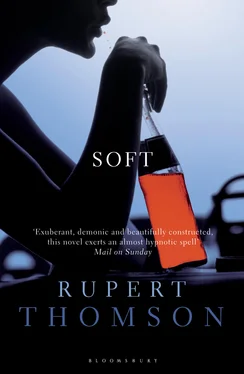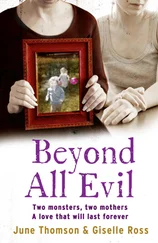‘He’s my son.’ Spaces seemed to open in the man’s face, between his features.
Arms folded, Barker leaned against the door-frame. He was into overtime with this conversation, and yet he didn’t want to be more brutal than he had to be.
‘He was squatting here,’ the man said suddenly. ‘I didn’t approve, of course.’ He was staring at the pavement, frowning. ‘He had a girlfriend. Vicky …’ He looked at Barker hopefully. Barker shook his head.
After the man had gone, Barker stood in his bedroom and stared out of the window. Rain fell lazily through the lamplight. He could still see Will Campbell, the way he had lurched up the street, a black bin-liner in one hand, the other clamped over a ghetto-blaster, which balanced, like a pet monkey, on his shoulder. He remembered how Will Campbell had thrown him a couple of V-signs — but only when a good distance had opened up between them, only when it was too late to make any difference. Shaking his head again, Barker walked into the lounge and sat down on a swivel chair he had taken from the old printer’s studio in the basement. In his mind he returned to Plymouth. Nineteen-eighty, eighty-one. Years after his marriage fell apart. One afternoon he happened to pass through Morice Town, which was where Leslie had grown up, and he suddenly remembered being told that she’d moved back into the area. He asked around on the estates. Eventually he found someone who had heard of her, who knew where she was living. A ground-floor flat in a drab four-storey block. He knocked on the door. His throat felt thick, and he could hardly swallow. What was he doing there? What did he want? Perhaps it was simply that no woman had replaced her in his life and sometimes, when he lay awake at night, he thought of how she used to dance for him, in that two-room flat she had in Devonport, in her red underwear.
Her mother, Diane, opened the door. Diane had dyed her hair a dark cherry colour, and she wore a big pink T-shirt over a pair of black leggings. Somewhere behind her, inside the flat, Barker heard a baby crying.
‘How are you, love? Give us a kiss.’
He leaned down, kissed her cheek. She smelled of deodorant and cigarettes. She had always been fond of him, Diane. She said he reminded her of her youngest brother, who had died in a car crash when he was seventeen. He stood outside her front door in the sunshine, answering her questions. It was a beautiful day — a blue sky and a fresh wind blowing from the west, the clothes on the communal washing-lines below them horizontal in the air.
While they were talking, he noticed a pigeon moving awkwardly along a low brick wall. It was huge, this pigeon, almost the size of a pheasant, and it only had one leg. When he pointed it out to Diane, she slit her eyes against the sun and lit another cigarette.
‘Christ,’ she said. ‘Seen it all now.’
They watched the pigeon in silence until it spread its wings and heaved itself into the air. Barker remembered being surprised that it could fly.
‘I suppose you’re looking for Leslie,’ Diane said eventually.
He nodded.
‘She’s down the pub. With Chris.’
‘Chris?’
‘Well,’ Diane said and then she sighed, ‘you know Leslie.’
He walked to the pub, which stood on the crest of a small hill not far from Dockyard Station. With one hand on the door, though, he hesitated, thinking it would probably be a mistake to go inside. As he stepped back, passing the window, he saw Leslie through the glass, her back half-turned, her feet in a square of sunlight. She had a Human League haircut, which must have been the fashion then, and she was wearing a skirt that was too young for her. A man with shoulder-length black hair stood next to her. In his jeans and faded blue tartan shirt, he had the look of a builder. Chris. They were in the middle of an argument. Barker couldn’t make out what Leslie was saying, even though her voice was the louder of the two. He thought he heard the words two hundred quid and bastard . Turning away, he walked down the hill to Saltash Road and caught a bus back to the city centre. He could remember nothing else about that day.
When Barker left his flat in the early evening, he half-expected to see Will Campbell’s father waiting outside the old warehouse, under the hoists, or on the corner by the corrugated-iron fence, but there was no sign of him. The rain had stopped. To the west, above the public gardens, a wall of cloud lifted high into the sky, glowing with an unearthly peach-coloured light. In medieval times, he thought, this would have heralded some terrible event — the murder of a king, for instance, or an outbreak of the plague. Death of one kind or another. He paused at the end of the street, wondering if the man in the dark-green anorak believed in omens. Then he turned left, making for the nearest phone-box, which was on Tooley Street.
The sky faded as he walked and by the time he reached the phone-box it was almost dark. He put some coins on the shelf in front of him, then lifted the receiver and dialled his mother’s number. Bella Dodds lived in a tower-block in Mount Wise. He used to be able to see her bathroom window from the walkway outside his flat. She had moved in fifteen years ago, after Frank died, and nothing had changed since then, her two imitation-leather armchairs in the lounge, her collection of china Alsatians, and the wind howling and moaning, eight floors up. At this time of day she would be drinking tea with a dash of Captain Morgan in it, or else a glass of Bols. There’d be a plate of Digestive biscuits on the table. She’d always liked her biscuits.
She picked up the phone on the seventh ring. ‘Yes?’
‘How are you, Ma?’
‘Oh, it’s you.’ Her voice sounded gravelly and rough, as if she had been sleeping. Perhaps it was simply that she hadn’t talked to anyone all day.
He asked her again. ‘How are you?’
‘Not so good, son. Not so good.’
It was the angina. She had chest pains and she was often short of breath. Sometimes the lift broke down and then she couldn’t get to the shops. None of the neighbours helped her, of course. They weren’t the type. Single mothers, petty thieves. Kids doing speed and glue. She had to live on what she’d put by in the kitchen cupboard: tins of Irish stew, cream crackers, Smash.
‘How’re Jim and Gary?’
‘Jim’s all right. Talked to him Wednesday. Gary’s not so good. That girl he was seeing, Janice. She left him.’ She paused and he could hear her lungs creak and whistle as she breathed in. ‘I don’t blame her,’ she went on. ‘He wasn’t nice to her.’
Barker thought of Jill sitting on the floor of his old flat, her legs folded beneath her, her bra-strap showing through the rip in her blouse.
‘I got a job,’ he said. ‘I’m cutting hair.’
‘Just like your father,’ she said, but it was just a statement of fact, and there was no nostalgia in it.
‘I got a flat too.’
‘You eating, are you?’
Barker didn’t answer.
‘I went to London once,’ she said. ‘We saw the soldiers parading up and down, those black hats on, all furry. What’s it called, when they do that?’
‘I don’t know.’
‘Anyway.’ She sighed and then said something he didn’t catch.
‘What’s that, Ma?’
‘You coming home for Easter?’
A sudden burst of laughter startled him until he realised it must have been the television. He glanced at his watch. Seven-thirty-five. He should have known she’d be watching TV. The soap operas, the shows. Des O’Connor was her favourite. A lovely man. Bob Monkhouse, she liked him too.
Not long afterwards his coins ran out. He told her he would call again soon, but he was cut off before he could say goodbye. He put the receiver back on its hook, then stepped out of the phone-box and stood on the pavement, watching cars hurtle through the orange gloom towards Jamaica Road.
Читать дальше












